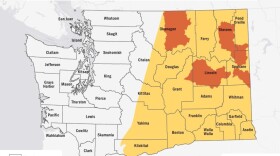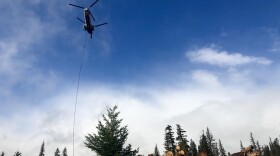-
Eastern Washington is in for another hot, dry summer. But – spring rains mean the west side of the state will no longer face a drought.
-
Climate change is forcing creative water storage options in the Yakima River Basin to ensure enough water for fish, cities and farmers.
-
A group of Coeur d’Alene tribal students is learning how to tell stories and make podcasts. The program they’re making tackles a pretty weighty subject. The tribe is working with the University of Idaho and the state University of New York at Buffalo to prepare young people to become tribal leaders.
-
A review of "mussel-inspired chemistry" points to promising ways we can learn from mussels about how to clean up water.
-
According to a new federal drought monitor map, the long-running dry spell finally looks to be over in most of the Northwest. Heavy snows and precipitation in February and early March have made up the difference. That’s good news for ranchers, irrigators, river rafters and salmon.
-
More people than expected are drinking water that could be harmful to their health. That’s according to a new study that looked at a water contaminate that’s been an issue in one of the Northwest’s most productive farming regions.
-
Almost 40 years ago, Scott Nicolai started his stream restoration career taking logs out of the water. A project that’s putting more than 6,000 logs back into remote streams across Central Washington.
-
Despite the growth of population in the western U.S., water use in cities such as Denver, Las Vegas, San Diego and Phoenix is going down. The reason? High-tech, low-flow toilets.
-
Nearly 100 public water systems around Oregon—including the state’s largest—will be required to begin testing for harmful contaminants from algae blooms under new rules unveiled by the Oregon Health Authority.
-
After extending the advisory over potentially harmful cyanotoxins for two weeks on June 11, Salem, Oregon, officials now say it’s unlikely the warning will be lifted June 25.
Play Live Radio
Next Up:
0:00
0:00
Available On Air Stations










